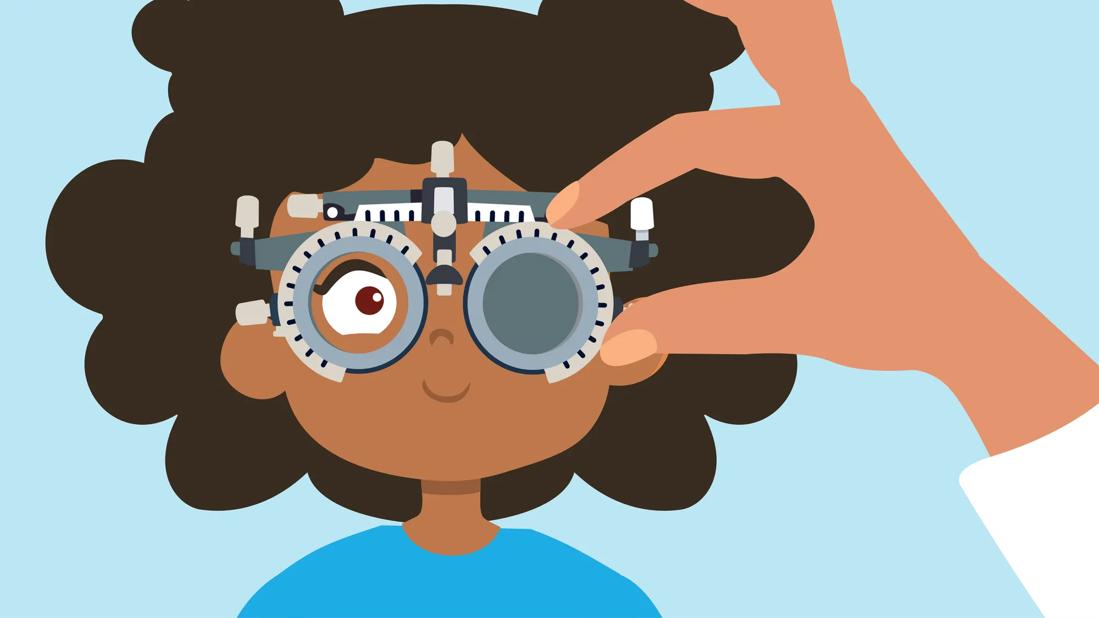Have their eyes evaluated shortly after birth, before their first birthday, and at ages 3, 5 and beyond

When should you get your child’s eyes checked? Pediatric ophthalmologist Elias Traboulsi, MD, MEd, says the answer is simple: early and often.
Advertisement
Cleveland Clinic is a non-profit academic medical center. Advertising on our site helps support our mission. We do not endorse non-Cleveland Clinic products or services. Policy
Some eye problems start in infancy and can affect vision for life. Catching issues early on can stop small ones from becoming bigger (and harder to treat) later on.
Following the American Academy of Ophthalmology, and from his personal experience, Dr. Traboulsi recommends pediatric eye exams at:
These exams are even more important for kids who:
If any of these apply — or if you think your child might have a vision problem — talk to your pediatrician or schedule an eye exam.
“Even if there are no obvious symptoms, your child may still have a problem with their vision,” says Dr. Traboulsi. “There’s no harm in getting a comprehensive eye exam.”
A pediatric eye exam begins with an open discussion about your child’s health, vision concerns and any family history of eye conditions. Based on these factors, a pediatrician or eye doctor will use different tests to evaluate your child’s eye health at different ages.
Advertisement
“Right now, we don’t think every child needs a full eye exam unless there’s a concern,” clarifies Dr. Traboulsi. “Having said that, if it’s possible, there’s no harm in getting a really comprehensive eye exam.”
If your child is nonverbal or has difficulty reading, they can use what’s called a preferential looking test or Teller Acuity Card® test. During these exams, a provider holds up cards that have a pattern or image on one side and nothing on the other. They observe which part of the card your child looks at and how they interact with that image.
“We then hold up cards with tighter and tighter patterns to determine how well your child can see them, until a point where they randomly look at the other side so that we know they’re not seeing it anymore,” explains Dr. Traboulsi. “That grating will give us an idea of the limit to their vision.”
Older children ages 3 to 6 who have difficulty reading or identifying their letters can also be tested by matching images and numbers on cards instead of reading a traditional eye chart.
Pediatric vision screenings and eye exams have similar goals, but one is more involved than the other.
Most kids have a pediatric vision screening before they start elementary school, especially if parents notice behaviors that signal they may have issues with their vision. These eye tests for preschoolers can be handled by your child’s school officials, nurses or pediatricians who are looking for visible signs of vision problems. Like regular physical exams, screenings are the first step of preventive care for your child’s eyes. They give healthcare providers a general sense of your child’s overall ability to see clearly.
Pediatricians and eye specialists usually recommend comprehensive pediatric eye exams as a follow-up to any red flags that are raised about your child’s vision. These tests are more in-depth and cover a wider range of testing to measure the actual health of your child’s eyes.
Advertisement
“If you’re suspicious that something is wrong, you shouldn’t take any chances,” advises Dr. Traboulsi. “You should come in for a complete, comprehensive eye exam where we can put all of these things into perspective.”
Advertisement
Learn more about our editorial process.
Advertisement

From playful movement to strength-building, kids need exercise to stay healthy and strong

Combat summer learning loss and keep young brains engaged with low-pressure learning

Heap on the praise for a job well done and stay consistent

Routine screenings at school are normal and important

Teaching kids how to share at the appropriate age can help them develop social skills and manage their emotions

By disrupting a child’s ability to think and act for themselves, snowplow parents run the risk of delaying their child’s ability to learn

Creating a pal in their mind can help children learn social skills, overcome fears and build creativity

Keep your child healthy and happy in the heat by ensuring they’re drinking water and taking breaks

Wearing a scarf, adjusting your outdoor activities and following your asthma treatment plan can help limit breathing problems

Your diet in the weeks, days and hours ahead of your race can power you to the finish line

When someone guilt trips you, they’re using emotionally manipulative behavior to try to get you to act a certain way